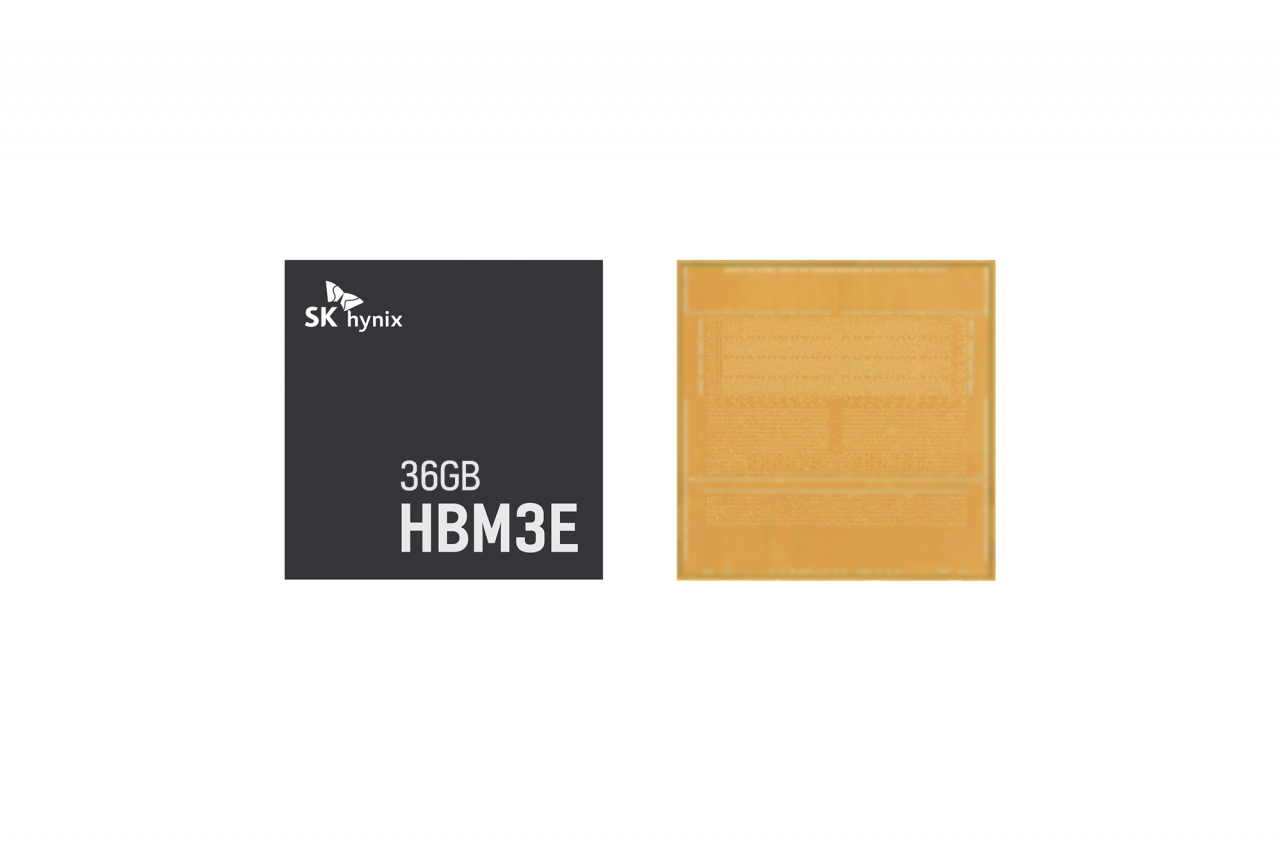
 > Business > Technology
> Business > Technology
 |
| SK hynix's latest 12-layer HBM3E chips (SK hynix) |
SK hynix, the world's second-largest memory chip-maker, said Thursday it has started mass production of the world’s first 12-layer high bandwidth memory chips, solidifying its competitive edge over its global rivals -- Samsung Electronics and Micron Technology.
The new 36-gigabit 12-layer HBM3E chip will be supplied to its customers, including US AI chip giant Nvidia, within the year, about six months after delivering an 8-layer HBM3E product to customers for the first time in the industry in March, according to SK hynix.
Compared to Samsung and Micron, which are still conducting quality tests with Nvidia for their 12-layer HBM3E chips, SK hynix's mass production is attributed to its strong trust relationship with the US firm.
The popularity of SK hynix's HBM products came as HBM chips, integral components used for artificial intelligence computing, have garnered increasing attention with the rise of applications, such as generative AI, exemplified by models like ChatGPT.
SK hynix, the fastest among the three memory companies to mass-produce 12-layer HBM3E products, intends to increase the proportion of the product in its overall HBM portfolio. Currently, HBM3 and 8-layer HBM3E chips dominate the market, but the 12-layer product is expected to be widely adopted in Nvidia's upcoming products.
"The 12-layer HBM3E product meets the world's highest standards in all areas essential for AI memory, including speed, capacity and stability," an SK hynix official said. "The company plans to continue its leadership in the AI memory market, addressing the growing needs of AI companies by being the first in the industry to mass-produce the 12-layer HBM3E.”
According to data by market analysis firm TrendForce, Nvidia's latest dedicated chip, Blackwell Ultra, will utilize 8 stacks of 12-layer HBM3E products. As a result, the share of 12-layer products in HBM3E is projected to rise to 40 percent next year, with potential for further growth.
SK hynix, already a leader in the HBM market, is expected to maintain its leading position in 12-layer products.
In the second quarter earnings call in July, an SK hynix official mentioned that the demand for 12-layer chips will increase significantly starting next year. By the first half of the year, the supply of 12-layer HBM3E products is expected to surpass that of 8-layer products. He further noted that the 12-layer HBM3E product would be the company’s flagship product next year.
“While the technical complexity of a 12-layer product is higher than that of an 8-layer product, SK hynix’s previous experience in mass-producing 12-layer HBM3 product will enable it to shorten the time required to achieve stable quality and yield,” the official said.
“The discussions with customers about next year’s production capacity have already been completed and we expect shipments to grow more than double compared to this year,” he added.
SK hynix recorded sales of 16.42 trillion won ($11.88 billion) and an operating profit of 5.47 trillion won in the second quarter of this year, marking the highest quarterly performance.
According to an analysis provided by FnGuide, its sales are expected to reach 18.35 trillion won with an operating profit of 7.01 trillion won, once again setting a new record for quarterly performance. Additionally, this year’s sales and operating profit are projected to be 66.26 trillion won and 21.16 trillion won, respectively.
As the HBM market shifts from 8-layer HBM3E to 12-layer products, Samsung and Micron are also trying to catch up with SK hynix.
Recently, Micron announced on its website that it had developed a 36-gigabyte 12-layer HBM3E product and has begun supplying samples to customers.
In the second-quarter earnings call, Samsung said that it plans to mass-produce an 8-layer HBM3E product by the third quarter and begin supplying a 12-layer product in the second half of the year.
According to TrendForce, SK hynix led the HBM market last year with a market share of 53 percent, followed by Samsung and Micron at 38 percent and 9 percent, respectively.








